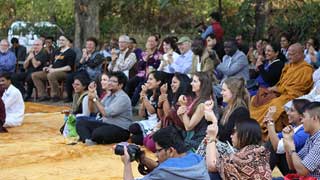The Word from Lansing: Just Governance: A Lesson in Loving Our Neighbors

Posted April 22, 2016

In the Gospel, Jesus tells his followers to “love your neighbor as yourself” (Mark 12:31). This passage calls us to recognize that we are part of the larger human family, a family that exists beyond geographic and political boundaries.
Walking across a plateau in Panchgani, India, almost 8,000 miles away from home, I felt this connectedness. As the sun rose that morning, I looked out on the valley with people from six continents and a variety of faith backgrounds. Each had come to participate in the Just Governance Forum at Asia Plateau, a dialogue about citizen responsibility. During the forum, we discussed violence and peacebuilding, marginalization, and good governance. Each day challenged me to examine divisions in my own community, as well as reflect upon what I could do in response.
If we are truly all part of the larger human family, the suffering of one of our members impacts us all (1 Corinthians 12:26). Dialogue participants from Sri Lanka, South Sudan, the Democratic Republic of Congo, and Nagaland, India, shared stories of violence in their countries. Others spoke of suffering due to cultural or religious stereotypes, government corruption, or lack of infrastructure or resources. I also saw suffering in the faces of the local poor, who reminded me of those back home and around the world struggling in similar ways.

Solutions cannot be found without first understanding the situations we wish to change. Communities must be willing to listen to the voices of those most impacted by these situations, especially the marginalized. In one powerful session, a dialogue speaker asked: “How can we treat people as partners, not as beneficiaries?” Effective responses cannot be found unless our work is inclusive and committed to the dignity of all.
As a Church, we must continue to encounter those in need. At Michigan Catholic Conference, I have seen Catholic agencies, parishes, and schools across the state listen compassionately to their communities and work alongside them for solutions. In India, too, I saw the Catholic Church’s work alongside the people. I visited St. Joseph Convent School, which is run by the Daughters of the Cross and has served Panchgani since 1895. The school offers local children the opportunity to be educated and to find acceptance, regardless of religious background or caste.

During my interview with Sr. Charmaine, the school’s principal (who knows all 500 children by name), I found out that most of her students are not Catholic. Almost 15,000 people live in Panchgani: 59.4 percent Hindu, 18.1 percent Buddhist, 14.8 percent Muslim, and only 4.3 percent Christian (2011 Census). Non-Catholic parents send their children to the school, however, because it provides quality educational opportunities and a welcoming atmosphere. When I asked Sr. Charmaine about having so many non-Catholics in the school, she responded that “all those who come we serve.”
Driven by its Catholic mission, the school promotes faith-filled values to help students become leaders and learn to “respond to the weakest and most suffering in love.” Sr. Charmaine, as principal, reminds the older girls that millions do not have access to education, so they never should take theirs for granted.
Like the example of St. Joseph Convent School, being Catholic means we are called to engage in our local communities and serve all those in need, including those of different faiths and backgrounds (A Place at the Table, USCCB). Efforts of peace, reconciliation, and cooperation require all of us working together, even if our action does not bear fruit immediately.
So how can we discover the needs of those around us and be present in those places, especially during this Year of Mercy? Today, let us start by loving, and then listening, to our neighbor.
